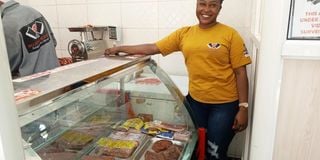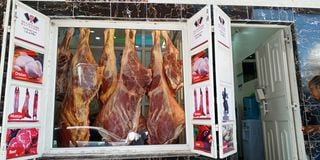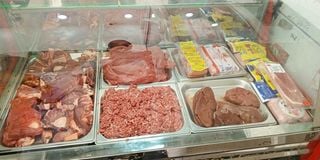Biz Lounge: Accountant’s dream behind Nakuru's Billionaire Butchery

Susan Mureithi, the CEO Billionaire Butchery poses for a photo on 21st November 2025
When Billionaire Butchery in Nakuru City first opened its doors in 2022, Susan Mureithi was driven by what she describes as a clear and ambitious vision.
“We started Billionaire Butchery because I wanted to provide high-quality, premium meat to my customers while creating a brand that stands for excellence and reliability,” she explains, adding that the idea emerged from her desire to elevate standards in the local butchery industry.
To bring this vision to life, the business began with a carefully planned capital investment raised entirely through savings.
According to Susan, “This strategic approach allowed us to invest in quality equipment, establish a solid operational foundation, and scale the business sustainably from the outset.”
Reflecting on the very first day the butchery opened, she recalls it as a defining moment filled with excitement, anticipation, and nervous energy.
“The overwhelming support from the community remains unforgettable. People kept stopping by to see the new butchery and try our products. It was humbling and reinforced our belief in the vision," she notes.

Display of meat at Billionaire Butchery on 21st November 2025
However, the early stages of building the business demanded immense sacrifice. Long hours, minimal leisure, and financial strain had to be endured.
“Personal time, leisure, and even financial comfort had to be put aside,” she shares, noting that these sacrifices shaped the strong work ethic and discipline that still guide the business today. Even so, she admits that moments of doubt inevitably arose. “Yes, there were moments of self-doubt, especially when facing financial pressures and operational challenges,” she says. Focusing on the bigger picture and trusting the quality of their products helped her push forward.
This journey was also influenced by her background, beginning in the banking sector where she worked for three years as an accountant. In 2018, she left the corporate world and started hawking sausages.
Her entrepreneurial spark was further inspired by her father, who owned a small butchery. In 2019, she joined him at the shop and began selling smokies to hawkers in town. After six months, she expanded into selling matumbo and liver.
During this period, she noticed her father was using many resources to source steak, so she stepped in to help. Her first attempt at buying a cow to process and sell, resulted in a loss because she gave out the bones and did not know how to price different cuts. She calls it a painful but necessary lesson.
Through it all, her husband, Brian Mureithi, remained a strong pillar of support both financially and emotionally. Together, they have grown the business from a two-person operation to a team of seven employees.
Susan emphasizes that quality labour remains essential for success, since staff must understand meat grading and how to handle customers professionally. Training inexperienced labour, she explains, would be costly and time-consuming.
Over the years, Billionaire Butchery has achieved steady growth thanks to strict sourcing standards, high hygiene levels, customer-centric service, and aggressive marketing.
Additionally, the introduction of meat combos priced between Sh 1,000 and Sh 3,000 has helped attract more customers, including other butcheries that now buy from them.

Display of meat sold at at Billionaire Butchery on 21st November 2025
The business has also evolved from processing one cow in four days to handling four cows a day, a significant milestone that was supported by transitioning from manual labour to machine-assisted operations.
This has made work easier, especially during high-pressure days. She highlights that record keeping has also been key to maintaining trust with clients, which has resulted in repeat customers and numerous referrals.
Despite the progress, challenges such as establishing credibility in a competitive market and managing operational costs have been notable hurdles. Still, the business overcame them by maintaining strict quality standards, building strong supplier relationships, and investing in staff training.
Looking ahead, Susan envisions opening more branches within and beyond Nakuru, expanding their product range, and introducing innovative services. She adds that sustainable growth and deeper community engagement remain core priorities.
One of the greatest lessons she has learned came from a marketing oversight. “We underestimated the importance of visibility in the beginning,” she admits. This realization led to more strategic marketing, which has played a significant role in strengthening the brand.
To young women aspiring to venture into agribusiness or entrepreneurship, she offers heartfelt encouragement: “Believe in your vision and remain resilient. Don’t underestimate your ability to succeed in male-dominated industries.” She emphasizes the importance of discipline, strategic planning, continuous learning, and surrounding oneself with supportive mentors. “With determination and a clear vision, you can break barriers and build a thriving business.”


